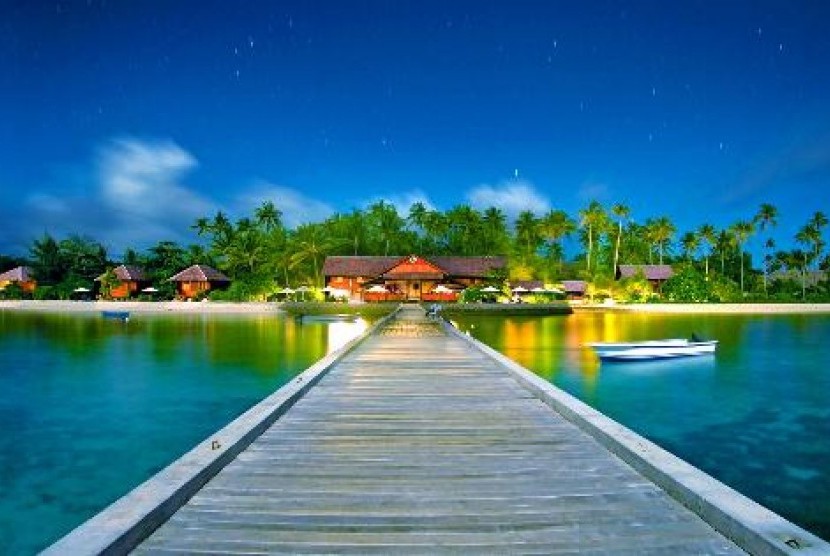REPUBLIKA.CO.ID, JAKARTA -- Scientists have been continuously encouraged to study marine biodiversity in Wakatobi National Park in the heart of the world's coral triangle.
Out of 850 underwater locations in Indonesia, 750 are found in Wakatobi National Park, which offers a stunning underwater paradise.
The Nature Conservancy (TNC) and the World Wide Fund for Nature reported in 2003 that there are 396 coral reef species and 590 fish species in the Wakatobi waters.
Science and Technology Adviser to the Administrator at USAID Washington DC, Alex Dehgan, also described Wakatobi as the heart of the world?s coral triangle, noting its high diversity of flora and fauna.
Further, speaking at the Wallace International Seminar in the Wakatobi Islands district town of Wangiwangi on Wednesday, Dehgan said the territorial waters of Wakatobi in Southeast Sulawesi, including Maluku, were one of the locations where British scientist Alfred Russel Wallace had conducted fieldwork.
"From his research, Wallace formed a fundamental theory about natural selection. He also performed research on biodiversity in the area, for both scientific and economic interests," Dehgan said during the seminar.
He noted that the present day tasks of researchers are to discover marine life that can be adapted as materials for medicine and cosmetics.
"Our responsibility as researchers is to continue to study marine biodiversity in the Wakatobi territorial area for the welfare of the local community and elsewhere," Dehgan noted.
Meanwhile, Prof Sangkot Marzuki of the Indonesian Academy of Science, also shared Dehgan' opinion, and said that Wakatobi territorial waters were the site where Wallace carried out his research.
"During Wallace's journey, the Wakatobi waters were one of the places he carried out his field work," Sangkot said during a ceremony to observe the 100th birthday of the British scientist in Wangiwangi on Sunday.
He noted that hundreds of scientists from universities at home and abroad have recognized Wallace's 100th birthday and organized the Wallace International Seminar.
Present at the Wallace International Seminar were scientists from Oxford University, Cambridge University, University of Indonesia, Hasanuddin University in Makassar and Haluoleo University in Kendari.
He added that the keynote speakers at the seminar were Wallace's grandson, Dr George C Wallace, in addition to Minister and Chief of National Development Planning Board (Bappenas) Armida Salsiah Alisjahbana.
The minister of the National Development Planning Board also asked scientists to continue studying marine resources from the Wakatobi waters to develop their use as medications and cosmetic ingredients.
"We expect that the research results would be a reference for governments and industry to take advantage of the natural resources in the region in a sustainable manner," she said.
Armida made the statement before hundreds of scientists from local and foreign universities who gathered in Wangiwangi to observe Wallace?s 100th birthday.
She said she also expects that the natural resources can be utilized as a source to improve the welfare of residents in Wakatobi, Indonesia and throughout the world.
The government has continuously focused on, and will continue to provide, economic empowerment to local residents to assure that exploiting natural resources in the region does not threaten the sustainability of the area's environmental safety, she noted.
"The guidance that can be given to the public is in the form of efforts to deal with climate change and provide economic empowerment to help develop potential sources, such as fisheries and seaweed," Armida said.
Meanwhile, Wakatobi district head Hugua said the district administration seeks to create an underseas paradise in the world?s coral triangle.
Hugua said this underseas paradise will serve as a source of revenues for the local community and as an attraction for both domestic and foreign tourists.
The Wakatobi district head noted that politics and power could change, but the vision to build the district would remain unchanged.
"The real underseas paradise will only be created if biodiversity throughout the Wakatobi National Marine Park will continue to be preserved and maintained," Hugua said.
According to Hugua, the Wakatobi National Marine Park has extensive biodiversity and UNESCO has named it a World's Biosphere Reserve.
Hugua said the decision to make Wakatobi a world biosphere reserve was reached at the 18th meeting of the International Advisory Committee for UNESCO's Man and the Biosphere (MAB) Programme in Paris held April 2-4, 2012.
"At the meeting, 26 areas were considered for world biosphere reserve status, though only 13 were approved, including Wakatobi. Five areas were given conditional approval and five other regions were rejected," he explained.
He noted that UNESCO wanted to protect three interests, while establishing the Wakatobi National Park as a centre of the world biosphere reserve, including local knowledge, environmental sustainability, and sustainable economic interests of the local society.
"UNESCO has declared the Wakatobi national park, which covers an area of 1.3 million hectares, to be a world biosphere reserve, along with 12 other biosphere reserves throughout the world," Hugua said.
In May 2013, Forestry Minister Zulkifli Hasan officially presented the biosphere reserve certificate from UNESCO to the Wakatobi district head.
With the inclusion of Wakatobi in the UNESCO Biosphere Reserve list, Indonesia now hosts eight biosphere reserves, out of the world's 598 biosphere reserves found in 117 nations.
Therefore, the minister at that time urged residents of Wakatobi to help protect and preserve their environment.
Since then, Wakatobi has sought to become a learning laboratory for researchers, students, local government, NGOs, the public and private sectors, as well as other stakeholders. (Otniel Tamindael)


